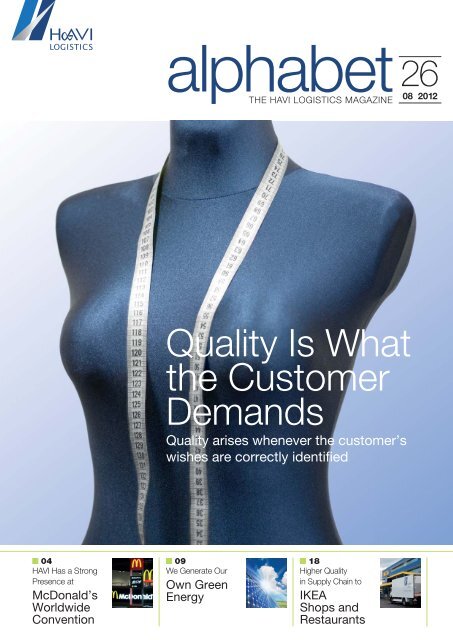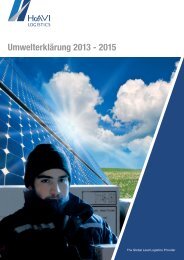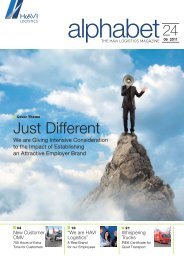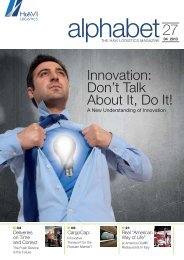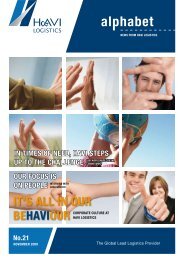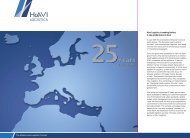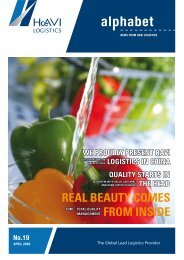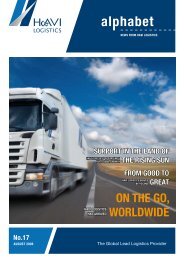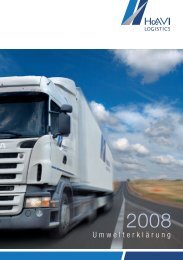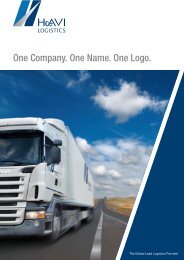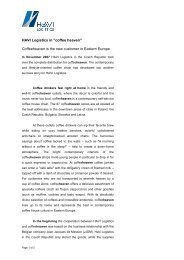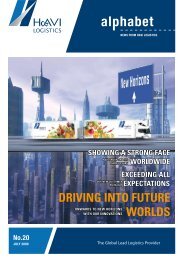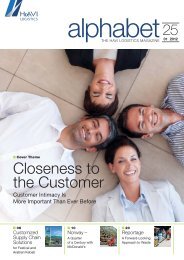3180,3 kB - Media Center - HAVI Logistics
3180,3 kB - Media Center - HAVI Logistics
3180,3 kB - Media Center - HAVI Logistics
Create successful ePaper yourself
Turn your PDF publications into a flip-book with our unique Google optimized e-Paper software.
04 09<br />
We Generate Our<br />
<strong>HAVI</strong> Has a Strong<br />
Presence at<br />
McDonald’s<br />
Worldwide<br />
Convention<br />
alphabet<br />
THE <strong>HAVI</strong> LOGISTICS MAGAZINE<br />
Quality Is What<br />
the Customer<br />
Demands<br />
Quality arises whenever the customer’s<br />
wishes are correctly identifi ed<br />
Own Green<br />
Energy<br />
18<br />
Higher Quality<br />
in Supply Chain to<br />
IKEA<br />
Shops and<br />
Restaurants<br />
26<br />
08 2012
2<br />
3<br />
9<br />
Content<br />
Editorial<br />
Development<br />
4<br />
6<br />
7<br />
Environment<br />
8<br />
<strong>HAVI</strong> Has a Strong<br />
Presence at McDonald’s<br />
Worldwide Convention<br />
Quality Without Compromise<br />
You Can’t Buy Compliance<br />
“Best of Sustainable<br />
Supply 2012” Award<br />
We Receive a<br />
“Sustainability Charter”<br />
We Generate Our<br />
Own Green Energy<br />
Publishing Information<br />
Proprietor:<br />
<strong>HAVI</strong> Global <strong>Logistics</strong> GmbH<br />
Publisher:<br />
Hans-Werner Krohn<br />
Content and Style Editor:<br />
Jasmin Schürgers<br />
Improvement<br />
10<br />
<strong>HAVI</strong> Global <strong>Logistics</strong> GmbH<br />
Geitlingstr. 20<br />
47228 Duisburg, Germany<br />
Phone: +49 (0) 20 65 / 695 541<br />
Fax: +49 (0) 20 65 / 695 252<br />
Email: info@havi-logistics.com<br />
www.havi-logistics.com<br />
Successful <strong>Logistics</strong> for the<br />
Euro 2012<br />
Quality & Service<br />
12<br />
14<br />
16<br />
17<br />
Quality Is What the<br />
Customer Demands<br />
Quality Is Not a Goal But<br />
a Never-Ending Process<br />
Interview with<br />
Lukas Curschellas<br />
Change for the Better<br />
10<br />
4 9<br />
Publishing Council:<br />
Haluk Ilkdemirci,<br />
Arnd Christochowitz,<br />
Hans-Werner Krohn,<br />
Sven-Carsten Sachse<br />
Layout:<br />
SanderWerbung GmbH<br />
Hans-Pfi tzner-Str. 31<br />
47057 Duisburg, Germany<br />
Printer:<br />
DRS Weirich<br />
Business Print Service GmbH<br />
Industriestrasse 17,<br />
41564 Kaarst, Germany<br />
Enlargement<br />
18<br />
19<br />
20<br />
21<br />
Just a Moment<br />
22<br />
23<br />
Higher Quality in the Supply<br />
Chain to IKEA Shops and<br />
Restaurants<br />
We Aquire Our First Customer<br />
in the Hotel Segment<br />
Llaollao - International<br />
Expansion Is Assisted by<br />
<strong>HAVI</strong> <strong>Logistics</strong><br />
<strong>HAVI</strong> <strong>Logistics</strong> Turkey<br />
Grows with Its New<br />
Customers<br />
Certifi ed as an “Especially<br />
Authentic Employer”<br />
Staying Focused…<br />
14<br />
Awards for <strong>HAVI</strong> <strong>Logistics</strong><br />
Poland<br />
This and the following editions could not be<br />
realized without the great help of our <strong>HAVI</strong><br />
<strong>Logistics</strong> members and all the other System<br />
Players. Thanks in advance for sending interesting<br />
topics to be published in the future.<br />
alphabet is printed on Satimat green (Antalis)<br />
200 g/sqm (cover) and 150/sqm (content).<br />
Satimat green is produced using 60% recovered<br />
fi ber with 40% virgin fi ber, and is an FSCcertifi<br />
ed product. Furthermore, Satimat green is<br />
climate neutral.<br />
www.fsc.org<br />
QUALITY<br />
MIX<br />
FSC ®<br />
Paper from<br />
responsible sources<br />
C021878<br />
QUALITY<br />
QU QUA QU QUA Q LIT IT ITY
source cover: thinkstock / sewing dummy over white<br />
source p. 3: fotolia / tom · source p. 14: thinkstock /Ryan McVay · source p. 20: LlaoLlao · source p. 22: Roberts Coffee<br />
20<br />
21<br />
Editorial<br />
Dear Friends and Partners<br />
of <strong>HAVI</strong> <strong>Logistics</strong>,<br />
The business of our customer, and<br />
therefore also our business, is infl uenced<br />
by many external and internal factors such<br />
as the situation of the world economy,<br />
food scandals and cost-cutting initiatives<br />
which hamper our efforts to carry out<br />
our growth plans. As we cope with these<br />
challenges, it is very important that we do<br />
not lose sight of our customers’ top priority,<br />
namely quality!<br />
Ever since our company was founded in<br />
1981, we have always tried our best to<br />
satisfy all our customers’ demands for<br />
the highest standards of quality and food<br />
safety, reliable supply chain management<br />
and innovative logistics concepts. At the<br />
same time our logistics activities were<br />
always in line with environmental sustainability<br />
and corporate social responsibility.<br />
This promise to our customers remains<br />
unchanged up to the present day and is<br />
becoming even more important.<br />
Achieving customer satisfaction is our top<br />
priority. We believe that it is not suffi cient<br />
to simply carry out our tasks well, to work<br />
carefully, to always be reliable, fast and<br />
clean, and to avoid making errors. It is not<br />
enough to just fi ne tune our range of services;<br />
instead, we also have to refi ne the<br />
quality of the services we deliver and the<br />
way they are performed. We want to be<br />
the perfect service provider – the one who<br />
does not only think the way its customers<br />
think but also anticipates their future requirements<br />
and comes up with innovative<br />
solutions.<br />
Quality and food safety are the essence<br />
of our customers’ business. Our customers<br />
expect a lot from us and our services.<br />
They expect to receive the goods they<br />
have ordered in the right quantity and<br />
quality and at the right time and place.<br />
They expect a proper fl ow of goods and<br />
information provided without any compromises.<br />
They expect that quality and food<br />
safety will not suffer while operational effi<br />
ciency continuously increases. It goes<br />
without saying that we are fully dedicated<br />
to meeting our customers’ expectations.<br />
Summing up, we acknowledge that our<br />
customers’ demands are nothing new for<br />
us. We can only achieve customer satisfaction<br />
by committing to and ensuring<br />
quality and food safety. We constantly<br />
strive to optimize our customers' supply<br />
chain and help them in becoming better<br />
and excelling in the products and services<br />
they offer.<br />
I hope you will enjoy reading the magazine.<br />
Yours sincerely,<br />
Haluk Ilkdemirci, President <strong>HAVI</strong> <strong>Logistics</strong> Europe<br />
alphabet I AUGUST 2012<br />
3
4<br />
Development<br />
<strong>HAVI</strong> Has a Strong<br />
Presence at<br />
McDonald’s Worldwide<br />
Convention<br />
On April 23-26, more than 15,000 McDonald’s owner/<br />
operators, suppliers and company employees gathered<br />
in Orlando, Florida for the 2012 McDonald’s<br />
Worldwide Convention. It was a celebration of System<br />
progress, a rally to drive for a bolder future and a<br />
showcase of the tools and solutions available<br />
to drive even greater results.<br />
<strong>HAVI</strong> had a strong presence at this<br />
year’s Convention, with employees from<br />
the <strong>HAVI</strong> Group and all three <strong>HAVI</strong> companies<br />
attending and making the most<br />
of the opportunity to connect with our<br />
customers. <strong>HAVI</strong> Global Solutions and<br />
The Marketing Store were two of the 250<br />
exhibiting suppliers on the exhibition<br />
fl oor, which covered more than 700,000<br />
square feet, while examples of <strong>HAVI</strong> were<br />
featured in multiple other booths.<br />
<strong>HAVI</strong> People all over the<br />
Convention Floor<br />
Over 100 <strong>HAVI</strong> employees from all of our<br />
business units and from countries around<br />
the world were present on the Convention<br />
fl oor to help share the <strong>HAVI</strong> story and listen<br />
to our customers as they toured the<br />
Convention fl oor over the fi ve days.
<strong>Logistics</strong> experts from <strong>HAVI</strong> <strong>Logistics</strong> Europe<br />
and <strong>HAVI</strong> <strong>Logistics</strong> Asia were ready<br />
to answer questions in the Supply Chain<br />
booth as were team members from <strong>HAVI</strong><br />
Global Solutions in the packaging area of<br />
the same booth.<br />
<strong>HAVI</strong> demonstrated its leadership on the<br />
sustainability front by coordinating the<br />
diversion of over 41 tons of food waste so<br />
that it could be composted rather than being<br />
dumped into a local landfi ll. A running<br />
ticker sign showed attendees how many<br />
pounds of waste were being diverted on<br />
a minute-by-minute basis - a great way to<br />
start a conversation about the recycling<br />
support <strong>HAVI</strong> can provide to Owner Op-<br />
erators both in the U.S. and around the<br />
world. A three minute video from <strong>HAVI</strong><br />
<strong>Logistics</strong> Environmental Service about the<br />
zero waste initiative in The Netherlands<br />
and Belgium ran continuously, reminding<br />
everyone who passed by that it is possible<br />
to convert or recycle all forms of waste<br />
that come out of a McDonald’s restaurant.<br />
This was the overall theme of the Convention<br />
and appeared in the global sessions,<br />
the area of the world sessions and all over<br />
the exhibit fl oor. The clear message was<br />
that consumers expect more from brands<br />
Brand Br Ambition – Good Food,<br />
Good G People, Good Neighbor<br />
Kevin Newell<br />
Think Bold. Act Bold. Be Bold.<br />
McDonald’s unveiled its<br />
new Brand Ambition in one<br />
of the global sessions, and<br />
it was reinforced in every<br />
area of the world session,<br />
showing alignment around<br />
the the System. Global Chief Brand Offi cer<br />
Kev Kevin Newell described the Brand Ambi-<br />
tio tion as a set of “internal screens” for ac-<br />
tio tion, not an external advertising campaign.<br />
HHe<br />
said it captures McDonald’s potential<br />
to<br />
touch the world like no other Brand and<br />
mmake<br />
a difference for customers, commu-<br />
nities nnities<br />
and the planet. He also emphasized<br />
the the importance of working together as a<br />
Syst System and with customers – because<br />
“inc “incredible power is unleashed when we<br />
do do things together.”<br />
Sustainability<br />
Su<br />
SSustainability<br />
was a big focus for the<br />
CConvention<br />
and will play an increasing<br />
rrole<br />
in McDonald’s business going forward.<br />
It was an integral part of the Brand<br />
Ambition messaging and the exhibit fl oor<br />
showcased it in a variety of ways: green<br />
leaf logos highlighted exhibit booths with<br />
a product or message supporting sustain-<br />
today than<br />
ever before, and McDonald’s must push<br />
for a bolder future. Continuing to lead in<br />
the marketplace will require out-of-the<br />
box thinking, creative ideas and bold<br />
action in line with McDonald’s priorities<br />
of optimizing the Menu, Modernizing the<br />
Experience and Broadening Accessibility.<br />
ability and recycling of various materials<br />
was available on the Convention fl oor.<br />
Leadership Transition<br />
McDonald’s CEO Jim Skinner retired at<br />
the end of June so the Convention was<br />
a celebration of his role in McDonald’s<br />
success and the legacy he leaves behind.<br />
Jim expressed his confi -<br />
dence in his successor,<br />
Don Thompson, and in<br />
new COO, Tim Fenton. Don<br />
made it clear that the transition<br />
would be seamless, emphasizing<br />
that McDonald’s<br />
would continue its focus<br />
on the Plan To Win and the<br />
three global priorities going<br />
forward.<br />
Don Thompson<br />
Tim Fenton<br />
“We at <strong>HAVI</strong> can be proud to be such an<br />
important supplier for McDonald’s,” says<br />
Russ Smith. “We should feel confi dent in<br />
the future direction of the company. There<br />
are plenty of opportunities for us to help<br />
McDonald’s continue to grow and, as a<br />
result, help our business grow. We have<br />
a key role to play in helping McDonald’s<br />
meet the challenges the future will bring,”<br />
he continued.<br />
alphabet I AUGUST 2012<br />
5
6<br />
Development<br />
Quality Without Compromise<br />
Now that <strong>HAVI</strong> <strong>Logistics</strong> has taken over salad distribution in Spain,<br />
it is delivering the entire range of goods for McDonald’s<br />
restaurants safely and reliably in this country, too.<br />
A McDonald’s restaurant uses up to 8<br />
different types of salad leaves – romaine,<br />
iceberg, batavia, frisee, spinach, rocket,<br />
Lollo Rosso and tatsoi (which originated<br />
in Asia) – and all of them are grown under<br />
controlled conditions that are carefully<br />
monitored. In Spain McDonald’s uses<br />
salad leaves and tomatoes grown in fi elds<br />
in the Spanish provinces Navarre, Málaga<br />
and Canary Islands. Just like all other<br />
locations of McDonald’s around the world,<br />
these sites are subject to strict quality<br />
controls – from cultivation and harvesting<br />
of the leaves, all the way to their use in<br />
one of the 428 Spanish McDonald’s restaurants.<br />
And supplying these extremely<br />
sensitive products requires safe and reliable<br />
logistics.<br />
<strong>HAVI</strong> <strong>Logistics</strong> in Spain assumed responsibility<br />
for this complex process in June of<br />
this year. Working in collaboration with STI<br />
Freight Management, it ensures smooth<br />
transportation of all salad items.<br />
If the greens are stored and transported<br />
at the optimum temperature, they can be<br />
kept for at least 7 to 13 days. During this<br />
period they are harvested, packaged and<br />
transported to the suppliers’ warehouses,<br />
and taken from there by STI to our Spanish<br />
DCs. Here they are stored, picked and<br />
dispatched to the McDonald’s restaurants,<br />
where they are freshly prepared for the<br />
customers – a tour de force of logistical<br />
organization that gives McDonald’s complete<br />
confi dence in our promise of quality.<br />
Controlling the supply chain to the<br />
McDonald’s stores on the Canary Islands<br />
is an additional challenge. Some salad<br />
products can be kept for a minimum of<br />
only seven days. To guarantee 100 percent<br />
quality and freshness for the goods, we<br />
had to adapt the weekly delivery schedule<br />
for those restaurants. Now the salad products<br />
reach all the 30 McDonald’s stores<br />
on Gran Canaria and Tenerife just one day<br />
after they are harvested.<br />
The customer service team receives orders<br />
for salad from Monday through Friday.<br />
Our employees work out the quantities<br />
they have to order from the three<br />
different factories. On average, they pass<br />
on about eight orders a day to the producers.<br />
On Fridays there are often up to 20<br />
orders since the quantities for the weekend<br />
have to be added. Each McDonald’s<br />
restaurant receives two to four salad deliveries<br />
per week. Over a year this amounts<br />
to around 6,000 tons of tomatoes, green<br />
leaves and fresh fruits.<br />
“Using our <strong>HAVI</strong> <strong>Logistics</strong> standards, we<br />
have been able to familiarize ourselves<br />
without any problem with the new workfl<br />
ows needed,” says Managing Director<br />
Pedro de Bernardo. “Now we supply the<br />
whole range of goods to all restaurants.<br />
McDonald’s had confi dence in our promise<br />
to always deliver 100 percent quality<br />
and food safety – without making any<br />
compromises.”<br />
Controlled<br />
quality at<br />
McDonald’s<br />
When the freshly harvested<br />
goods are received, their quality<br />
and temperature are checked.<br />
During processing the most<br />
varied factors are monitored,<br />
such as temperature, quality of<br />
the cut, cleanliness, composition<br />
and humidity.<br />
When the goods are packaged,<br />
there is another check for<br />
temperature, metal inclusions,<br />
appearance and tightness<br />
of the seal.<br />
Every day the company’s own<br />
lab conducts sensory tests and<br />
rapid microbial tests (for E. coli).<br />
Only if the results are absolutely<br />
faultless are the products<br />
allowed to be delivered to the<br />
McDonald’s restaurants.<br />
Retained samples are taken<br />
several times a day.<br />
As an extra safety measure,<br />
external laboratories regularly<br />
examine microbiological status<br />
and test for pesticides.
You Can’t Buy Compliance<br />
In business, compliance means conforming to relevant laws, rules, specifi cations or policies – both internal and<br />
external. Compliance is not an invention of smart lawyers but a basic principle of applicable law; a company’s longterm<br />
business success depends on following the rules. Now, what does compliance mean for <strong>HAVI</strong> <strong>Logistics</strong> and<br />
how do we ensure a holistic approach to compliance?<br />
With ever more regulations and the<br />
need for operational transparency, organizations<br />
are increasingly adopting consolidated<br />
and harmonized compliance<br />
measures. This ensures that all necessary<br />
governance requirements can be met<br />
without duplicating work unnecessarily.<br />
100% compliance –<br />
no exceptions!<br />
<strong>HAVI</strong> <strong>Logistics</strong> has implemented many<br />
compliance tools, the most important of<br />
which is our strong compliance culture.<br />
Ever since the company was established in<br />
1981, we have abided by our statements<br />
that “we uphold the laws of the land” and<br />
“law and order are social values we hold<br />
in the highest esteem” in our corporate<br />
culture and have always expected all our<br />
employees to be role models concerning<br />
these principles.<br />
In 2008, we stated that violations of these<br />
principles would not be tolerated, in our<br />
“Code of Ethical Business Conduct.” As<br />
a consequence, we established a whistleblower<br />
hotline and the Compliance Committee,<br />
which investigates potential violations<br />
of the applicable rules and initiates<br />
appropriate action. Throughout our corporate<br />
history, we have also issued a variety<br />
of guidelines and internal controls to guide<br />
our employees.<br />
Of course, this may seem like a lot. Yet our<br />
continuous growth brings new challenges.<br />
Different countries have different legal requirements,<br />
new customers have new<br />
needs regarding food quality and safety,<br />
and new employees might not always be<br />
aware of our cultural heritage. Given this<br />
development, it is apparent that we need<br />
to do more to ensure that we know what<br />
compliance means and can act compliantly.<br />
In particular, we need a more holistic<br />
and structured approach to compliance<br />
management.<br />
The <strong>HAVI</strong> <strong>Logistics</strong> Compliance Committee<br />
has assigned the task of successively<br />
optimizing our existing compliance management<br />
system to Petra Luzar, Director<br />
Corporate Legal Department. The international<br />
consultancy fi rm KPMG has helped<br />
us hold several workshops. We would now<br />
like to familiarize you with the status of the<br />
task and the next planned steps.<br />
First of all, the Compliance Committee reaffi<br />
rmed that compliance is recognized as<br />
a key success factor at <strong>HAVI</strong> <strong>Logistics</strong>.<br />
Petra Luzar, Director Corporate Legal Department<br />
“We formulated the misson statement:<br />
Compliance Management at <strong>HAVI</strong><br />
<strong>Logistics</strong> should foster the established<br />
culture of complete (100%) adherence<br />
to legal requirements and internal policies<br />
and standards while proactively addressing<br />
corporate risks in light of continuous<br />
growth.”<br />
In several reiterations, many of our internal<br />
specialists from different areas of expertise<br />
including Operations, Finance, HR and IT<br />
then helped identify our biggest compliance<br />
risks. They identifi ed worst case scenarios,<br />
supposing that we had not even<br />
implemented the existing mitigating measures<br />
(e.g. guidelines, internal controls) and<br />
evaluated which of these would harm <strong>HAVI</strong><br />
<strong>Logistics</strong> most – either fi nancially, or indirectly<br />
as a result of harming our customers.<br />
The gross risks will now form the basis<br />
for a thorough gap analysis, i.e. we will<br />
again apply our internal expertise to identify<br />
which mitigating measures we have<br />
implemented in relation to which risk, and<br />
whether these measures are appropriate<br />
and suffi cient to reduce said risk – preferably<br />
until it vanishes. The results of the gap<br />
analysis will be used to determine the optimum<br />
measures to close the gaps. These<br />
will probably include revising existing<br />
guidelines to increase their comprehensibility,<br />
and providing appropriate training for<br />
people expected to follow the guidelines.<br />
This will enable us, over the mid-term, to<br />
ensure that we have a structured and holistic<br />
compliance management system that<br />
enables people within our organization to<br />
access and understand the relevant rules<br />
easily and also enables <strong>HAVI</strong> <strong>Logistics</strong> to<br />
check and document for audit purposes<br />
that these rules have been followed.<br />
Yet the fact that we are optimizing our existing<br />
compliance management system<br />
does not mean we can now relax and wait<br />
for implementation. All of us must be aware<br />
that we are in charge of compliance and<br />
can be held responsible. We all need to<br />
be role models and to live our values and<br />
our culture. We need to know and apply all<br />
the relevant rules and should always ask<br />
ourselves whether what we’re doing is correct.<br />
Furthermore, we should seize the opportunity<br />
to address any questions we may<br />
have about compliance to the Compliance<br />
Committee, which will be able to provide<br />
guidance on all compliance matters.<br />
Any questions can be addressed<br />
to the Compliance Committee<br />
compliance@havilog.com,<br />
or call Petra Luzar at +49 2065 695695.<br />
alphabet I AUGUST 2012<br />
7
8<br />
Environment<br />
The specially designed green trucks are a familiar<br />
sight on the roads in the Netherlands and in<br />
Belgium.<br />
<strong>HAVI</strong> <strong>Logistics</strong> Environmental Services<br />
(HES) has received the award entitled<br />
“Best of Sustainable Supply 2012.” The<br />
<strong>HAVI</strong> <strong>Logistics</strong> environmental services<br />
company was honored by the McDonald’s<br />
Corporation for its Reverse <strong>Logistics</strong> project.<br />
Around 400 companies from all over<br />
the world were nominated for the award,<br />
with which McDonald’s pays tribute to<br />
suppliers who have introduced sustainable<br />
environmental management practices.<br />
A jury including McDonald’s top management<br />
and representatives of the World<br />
Wildlife Fund (WWF) chose HES as one of<br />
the winners.<br />
From restaurant to recycling point: since<br />
1991 <strong>HAVI</strong> <strong>Logistics</strong> Environmental Services<br />
in Amersfoort has been respon-<br />
“Best of Sustainable<br />
Supply 2012”<br />
Award<br />
Praise from McDonald’s<br />
for action on sustainable<br />
environmental protection.<br />
sible for waste management logistics for<br />
the McDonald’s restaurants in the Netherlands.<br />
The specially designed green<br />
trucks deployed by the environmental<br />
services company are a familiar sight on<br />
the roads in Belgium, too. They call at almost<br />
280 McDonald’s restaurants, where<br />
they pick up refuse such as paper, foil,<br />
vegetable fat and waste food and bring<br />
them to the recycling point. “The world of<br />
recycling and processing waste is a very<br />
dynamic one where new solutions come<br />
to market on a daily basis. It is <strong>HAVI</strong> Environmental<br />
Services’ role to develop from<br />
all these options the best solution for our<br />
customers and manage this on a daily<br />
basis,” explains Olav Gribnau, Managing<br />
Director of <strong>HAVI</strong> <strong>Logistics</strong> Environmental<br />
Services. The company has now received<br />
recognition for this commitment: “The<br />
nominations show that McDonald’s supply<br />
chain currently is in an excellent position<br />
to make safe and sustainable deliveries<br />
of food products,” says Jose Amario,<br />
Executive Vice President of the Global<br />
Supply Chain, Development & Franchising<br />
at McDonald's. “We really appreciate<br />
the efforts made by all our suppliers.”<br />
Olav Gribnau views the “Best of Sustainable<br />
Supply” award as both an honor and<br />
an incentive. “Being singled out for this<br />
award by McDonald’s is recognition of<br />
the work we have done in the past and at<br />
the same time a vote of confi dence from<br />
our customer in the new developments<br />
we will continue to pursue in the fi eld of<br />
reverse logistics.”<br />
<strong>HAVI</strong> <strong>Logistics</strong> Among the<br />
First Companies to Receive<br />
a “Sustainability Charter”<br />
Every year since 2008 <strong>HAVI</strong> <strong>Logistics</strong> Belgium has successfully obtained<br />
a national “Environmental Charter” issued by the Belgian government. Not<br />
only has the team located in Belgium been audited according to the applicable<br />
environmental regulations; it also had to meet at least three additional<br />
requirements with respect to the environment.
We Generate Our Own Green Energy<br />
New special photovoltaic system for generating our own electricity<br />
A total of 3,024 solar modules,<br />
350,000 kilowatt hours of energy, and CO2 emissions reduced by around 131 tonnes<br />
every year – these are the statistics for the<br />
new photovoltaic system that went into<br />
operation at the end of April on the <strong>HAVI</strong><br />
<strong>Logistics</strong> Distribution <strong>Center</strong> in Günzburg,<br />
Germany. It is based on a model that has<br />
been unique in Germany to date: <strong>HAVI</strong><br />
<strong>Logistics</strong> obtains green solar power generated<br />
by this system on good terms and<br />
conditions, and in return we waive the<br />
rental fee for having the installation on our<br />
roof.<br />
“With conventional systems, all the energy<br />
is fed into the electric power system and<br />
its monetary value is paid out to the solar<br />
In 2011 <strong>HAVI</strong> <strong>Logistics</strong> was one of a<br />
few companies chosen to participate in<br />
a new initiative: the “Sustainability Charter.”<br />
Whereas the Environmental Charter<br />
has an environmental focus, the requirements<br />
for obtaining the Sustainability<br />
Charter are far more extensive. First of all,<br />
a company must have received the Environmental<br />
Charter at least three years in<br />
succession. Furthermore, it has to pass a<br />
“Sustainability Check” aimed at evaluating<br />
its previous efforts in the areas of “people”<br />
and “prosperity.”<br />
energy producer,” explains Harald Klein,<br />
Senior Manager Customer Support, who<br />
is also responsible for <strong>HAVI</strong> <strong>Logistics</strong>’<br />
environmental projects in Germany. “In<br />
our case we make the 8,400 square meter<br />
roof available and in return we receive all<br />
the solar energy we need to supply our Distribution<br />
<strong>Center</strong>.” This comes to 350,000<br />
kilowatt hours of energy annually – which<br />
is a huge amount, equal to the average<br />
consumption of 100 German households<br />
– and it is generated on the roof of our<br />
Günzburg Distribution <strong>Center</strong>. We use<br />
100 percent of this green electricity ourselves.<br />
“At the same time our new photovoltaic<br />
system reduces annual CO2 emissions by around 131 tonnes,” Harald<br />
Klein points out. And this contribution to<br />
environmental conservation is truly visible<br />
in Günzburg: a large display at the Distribution<br />
<strong>Center</strong> shows employees and visitors<br />
the amount of energy produced daily,<br />
the total amount generated, and the CO2 savings realized since the solar power<br />
system was installed.<br />
Once a company has been accepted and<br />
allowed to apply for the Sustainability Charter,<br />
it has to meet the following minimum<br />
requirements:<br />
three requirements related<br />
to the environment<br />
two requirements related<br />
to people<br />
one requirement related<br />
to prosperity<br />
After <strong>HAVI</strong> <strong>Logistics</strong> introduced photovoltaic<br />
systems in Spain and Italy, Günzburg<br />
became the third company site in Europe<br />
to start generating solar power. With this<br />
system, <strong>HAVI</strong> <strong>Logistics</strong> reduces its CO2 emissions by approximately 400 tonnes<br />
every year. And the fi gure is set to rise:<br />
for the medium term <strong>HAVI</strong> <strong>Logistics</strong> is<br />
planning additional solar power installations<br />
on its Distribution <strong>Center</strong>s in Europe.<br />
Together with four other companies, <strong>HAVI</strong><br />
<strong>Logistics</strong> Belgium has successfully obtained<br />
the certifi cate. On June 1 of this year it was<br />
handed over to Els Thys, Management Assistant<br />
and QSE Coordinator at <strong>HAVI</strong> <strong>Logistics</strong><br />
Belgium, by Rik Röttger, member of<br />
the Antwerp government responsible for the<br />
environment.<br />
For the upcoming year the Belgian team has<br />
already committed again to obtain this charter<br />
as part of its efforts to ensure an optimized<br />
sustainable supply for our customers.<br />
alphabet I AUGUST 2012<br />
9
10<br />
Improvement<br />
Successful<br />
<strong>Logistics</strong> for<br />
the Euro 2012<br />
For Poland and Ukraine the Euro 2012 was surely the<br />
greatest sports event of all time. For <strong>HAVI</strong> <strong>Logistics</strong>,<br />
it presented a stupendous logistics challenge – probably<br />
the greatest we have faced since we started<br />
working for McDonald’s.<br />
From June 8 to July 1, 16 national<br />
teams fought for the European title in<br />
fi ercely-contested matches held in worldclass<br />
stadiums in Poland and Ukraine. Ultimately,<br />
Spain emerged the winner after a<br />
tense fi nal against Italy. The Spanish team<br />
won due to a combination of factors – precise<br />
preparation, tactics, teamwork, speed<br />
and perfection on the fi eld – that aptly<br />
describe the logistics provided by <strong>HAVI</strong><br />
<strong>Logistics</strong> for the numerous McDonald’s<br />
restaurants in the fan zones and stadiums.<br />
Working with McDonald’s, the <strong>HAVI</strong> <strong>Logistics</strong><br />
teams in Poland and Ukraine started<br />
more than a year in advance to do the<br />
groundwork for the major logistics effort<br />
that would be required during the Euro<br />
2012. Large-scale events of this kind require<br />
intricate coordination of our customer<br />
expertise, sales planning, and transport<br />
and warehousing logistics. Whereas<br />
our Ukrainian team “only” had to make<br />
deliveries to McDonald’s, their Polish<br />
counterparts also had to ensure that the<br />
services they provided to BP and Coffee<br />
Heaven were of the accustomed quality.<br />
“These intensive preparations were vital<br />
and made in close consultation with our<br />
customer,” says Andreas Röder, Managing<br />
Director of <strong>HAVI</strong> <strong>Logistics</strong> in Poland.<br />
“In addition to McDonald’s restaurants,<br />
the BP shops and Coffee Heaven outlets<br />
reported brisker business during the Euro<br />
2012.”<br />
Way before the games, McDonald’s and<br />
<strong>HAVI</strong> <strong>Logistics</strong> identifi ed locations in and<br />
around the fan zones in Poland and<br />
Ukraine where sales were expected to<br />
soar. “Emergency measures” were then<br />
introduced at both <strong>HAVI</strong> <strong>Logistics</strong> and Mc-<br />
Donald’s for the 355 existing McDonald’s<br />
restaurants and 13 McDonald’s restaurants<br />
to be set up especially for the tournament.
The idea was to prevent outof-stock<br />
situations at all costs.<br />
McDonald’s and our local <strong>HAVI</strong> <strong>Logistics</strong><br />
companies decided to boost warehouse<br />
stocks in both countries several weeks<br />
before the big event.<br />
Our goal was to keep all the restaurants<br />
fully supplied during the European Championship.<br />
This meant that on average 50%<br />
more pallet spaces had to be provided for<br />
each warehouse sector. To achieve this<br />
goal, additional warehouse space was<br />
rented near the stadiums in both countries.<br />
McCafé made its debut at the<br />
Euro 2012 this year.<br />
This happened, for example, at the media<br />
centers in the Polish and Ukrainian football<br />
stadiums. At the media center of the<br />
German Football Association in Danzig, a<br />
complete McCafé was set up to offer the<br />
German players and organizers typical<br />
German specialties as well as a new item<br />
currently making waves in Germany: bubble<br />
tea!<br />
Just setting up and equipping the McCafé<br />
outlets was a logistics tour de force: STI<br />
Freight Management transported all the<br />
restaurant equipment from Germany to Poland<br />
while <strong>HAVI</strong> <strong>Logistics</strong> Poland supplied<br />
the entire product assortment.<br />
Every employee of <strong>HAVI</strong> <strong>Logistics</strong> in Poland<br />
and Ukraine was involved in preparing<br />
for the expected onslaught of fans. The<br />
Customer Service teams were on duty 24/7<br />
and 86 trucks, many sporting the Euro 2012<br />
design, were on the road virtually non-stop.<br />
On top of all this, our dispatchers and<br />
drivers had to observe the special restric-<br />
tions imposed on suppliers to the stadiums<br />
and fan zones – such as making deliveries<br />
only at night or using vans instead<br />
of big trucks. Drivers delivering directly to<br />
the stadiums had to be accredited and underwent<br />
stringent security checks at the<br />
entrances.<br />
“Despite the many adverse conditions<br />
and the staggering amount of overtime<br />
we put in, our teams were in high spirits<br />
and really pulled together,” said Sergey<br />
Ustinov, Managing Director of <strong>HAVI</strong><br />
<strong>Logistics</strong> Ukraine. “Extra delivery trips,<br />
weekend work and night deliveries were<br />
all part of the package but none of this put<br />
a damper on the commitment and enthusiasm<br />
of our employees.” Andreas Röder<br />
added: “It is true that the employees involved<br />
were affected by Euro 2012 fever.<br />
More importantly, however, they were<br />
working together to reach the common<br />
goal of making the football tournament<br />
a success for our customer.” Thanks to<br />
perfect preparations and smooth deliveries,<br />
the Euro 2012 was a huge success<br />
for both McDonald's and <strong>HAVI</strong><br />
<strong>Logistics</strong>.<br />
alphabet I AUGUST 2012<br />
11
source: thinkstock / centimeter 4<br />
12<br />
Cover Theme<br />
Quality & Service<br />
Quality Is What the<br />
Customer Demands<br />
Our world is dominated by buzzwords concerning quality:<br />
automation, rationalization, lean management,<br />
globalization, Internet, etc. Quality management is<br />
another term heard frequently and often determines<br />
a company’s competitiveness.<br />
Quality arises whenever the customer’s<br />
wishes are correctly identifi ed.<br />
In other words, it is the customer who<br />
determines what quality is.<br />
Every company depends on<br />
satisfi ed customers.<br />
The quality of a company’s products and<br />
services, as well as the type of relationship<br />
it has with its customers, has always<br />
been a key factor determining its market<br />
value. Not only are ever higher demands<br />
being placed on quality; quality is now required<br />
in many different areas – ranging<br />
from a friendly reception over good service<br />
up to fast spare-part delivery. And all<br />
these demands are being made despite<br />
the constant pressure on prices.<br />
A binding defi nition of what constitutes<br />
good quality is drawn up by each industry<br />
and continually updated. Examples of<br />
industry-specifi c quality regulations are<br />
source: thinkstock / service bell<br />
the international HACCP hygiene<br />
standard in the food industry and the<br />
stringent quality standards that the automotive<br />
manufacturers demand of their<br />
suppliers.<br />
The Crafts and Trades Regulation Codes<br />
describe, in some cases very precisely,<br />
which technical rules are to be observed.<br />
Companies that do not meet the quality
source: thinkstock / sewing dummy over white<br />
standards in their industry are soon<br />
swept off the market.<br />
However, industry-specifi c standards<br />
alone are often inadequate.<br />
Entrepreneurs who want to succeed<br />
in the marketplace have<br />
to repeatedly ask themselves<br />
what else<br />
they can do in order to offer high-quality<br />
products (and to be better than their competitors).<br />
For this reason, every product and service<br />
has to undergo critical scrutiny on a<br />
regular basis. Can the service provided be<br />
improved? Could the customer service<br />
be better? Are the employees’<br />
customer orientation and<br />
knowhow up to date? Does<br />
the product meet customers’<br />
wishes today and will it meet<br />
them tomorrow?<br />
Paying attention to quality involves<br />
setting down the quality<br />
requirements for a product or<br />
The History of Quality Management<br />
Quality management was invented<br />
in the U.S. by William Edwards Deming.<br />
However, after the end of World War II<br />
his ideas were widely ignored: the international<br />
business community was more<br />
concerned at that time about rebuilding<br />
the production capacities destroyed<br />
worldwide during the war. Yet in wartorn<br />
Japan his ideas fell on more fertile<br />
PDCA cycle by William Edwards Deming<br />
The demands placed on the<br />
quality of a product change<br />
continually.<br />
ground. In the Land of the Rising Sun<br />
quality management soon became a<br />
respected philosophy: as early as 1951<br />
a Japanese company was the recipient<br />
of the Deming Award for especially<br />
high quality standards. In the following<br />
decades Japanese manufacturers conquered<br />
market shares around the world<br />
with their high-quality, reasonably priced<br />
source: panthermedia / Randolf Berold<br />
service. Quality must be controlled and is<br />
therefore a task for the management.<br />
However, quality management will not<br />
succeed until it is part of the corporate<br />
culture and infl uences the daily actions<br />
of all employees. The results of scientifi c<br />
studies conducted in the U.S. show that,<br />
in comparison with their competitors,<br />
companies with quality management programs<br />
have higher turnover and profi ts,<br />
greater productivity, better stock performance<br />
and faster-growing workforces.<br />
Despite all their efforts to achieve comprehensive<br />
quality management, companies<br />
should never lose sight of one central<br />
idea: quality is not a goal but a never-ending<br />
process guided by the ideal of perfect<br />
customer satisfaction.<br />
products. Eventually U.S. companies<br />
turned their attention toward Japan and<br />
discovered Deming's quality philosophy.<br />
In the 1970s and 1980s this philosophy<br />
was also introduced at U.S. companies,<br />
and in the late 1980s quality management<br />
fi nally reached Europe. Some of<br />
the fundamental principles of this philosophy<br />
are stated below:<br />
Quality is geared to the customer.<br />
Quality is achieved by employees<br />
in all sectors and at all levels.<br />
Quality has several dimensions;<br />
these have to be made<br />
operational by applying<br />
appropriate criteria.<br />
Quality is not a goal but a<br />
never-ending process.<br />
Quality refers to services<br />
as well as products.<br />
Quality requires a proactive<br />
approach and hard work.<br />
alphabet I AUGUST 2012<br />
13
source: thinkstock / Ryan McVay<br />
14<br />
Cover Theme<br />
Quality & Service<br />
QUALITY<br />
QUALITY<br />
We make sure all our corporate divisions<br />
get a thorough checkup on a regular<br />
basis. AIB GMP audits, the Distributor<br />
Quality Management Process (DQMP)<br />
and the Distribution Performance Index<br />
(DPI) are examples of the quality checks<br />
that external experts from independent<br />
institutes and McDonald’s management<br />
conduct at our Distribution <strong>Center</strong>s. Frequently<br />
the auditors cannot fi nd anything<br />
at all that needs to be improved. Almost<br />
all the <strong>HAVI</strong> <strong>Logistics</strong> companies come<br />
through these checks with fl ying colors,<br />
i.e. they are ranked either “excellent”<br />
(DQMP) or “superior” (AIB GMP).<br />
Several <strong>HAVI</strong> <strong>Logistics</strong> companies have<br />
had their quality management systems<br />
audited and are now certifi ed according<br />
to globally recognized standards such as<br />
EN ISO 9001, ISO 22000 or the environ-<br />
Quality Is Not a Goal<br />
But a Never-Ending Process<br />
For more than 30 years now <strong>HAVI</strong> <strong>Logistics</strong> has been the Lead <strong>Logistics</strong> Provider<br />
for the food service industry. We're in the premier league when it comes<br />
to quality. We have weathered various crises by consistently pursuing our goals:<br />
100% employee satisfaction, 100% customer satisfaction, zero tolerance on<br />
errors right from the outset, and continual improvements to all workfl ows.
mental standard ISO 14001. And it is true<br />
that our quality management system covering<br />
the <strong>HAVI</strong> <strong>Logistics</strong> group extends far<br />
beyond EU regulations. Food safety is a<br />
major aspect of the highest importance.<br />
All along our customers’ supply chains we<br />
guarantee the highest quality standards in<br />
line with HACCP and QIP. Our traceability<br />
system allows uninterrupted tracking of<br />
goods between the suppliers, our Distribution<br />
<strong>Center</strong>s and our customers’ delivery<br />
points.<br />
The indicators we use to measure our performance<br />
are equally vital in our efforts<br />
to guarantee quality. Our top priority is to<br />
ensure punctual and reliable deliveries.<br />
On average, 97% of all our deliveries in<br />
Europe during the fi rst quarter of this year<br />
arrived on schedule. Reliability of supply<br />
is something we can be proud of at <strong>HAVI</strong><br />
<strong>Logistics</strong>. During the same period an average<br />
of 93% of all deliveries were correctly<br />
picked and arrived at the customer in perfect<br />
condition.<br />
Yet, however much effort we put into our<br />
extensive quality management process,<br />
our guiding principle still remains the<br />
same: quality is not a goal but a never<br />
ending process geared to ensuring total<br />
customer satisfaction. “Not a day should<br />
go by without some improvement in the<br />
company,” is the thought behind the Japanese<br />
“kaizen” life and work philosophy.<br />
According to kaizen (kai = change; zen<br />
= for the better), one should aim for continuous,<br />
unending improvement in all areas<br />
– and this refers to all the employees,<br />
managers and executives. Better quality<br />
and lower costs ultimately result in greater<br />
customer satisfaction.<br />
Outside Japan the basic ideas of kaizen<br />
have been adopted under the name<br />
“Continuous Improvement Process” (CIP).<br />
This has become a permanent part of <strong>HAVI</strong><br />
<strong>Logistics</strong>’ quality management.<br />
“Consider each day how you<br />
can do something better.”<br />
CIP is not a tool but a way of thinking, a<br />
way of perceiving workfl ows and processes<br />
and making all of this second nature.<br />
The process is based on “empowering”<br />
the <strong>HAVI</strong> <strong>Logistics</strong> workforce and a fundamental<br />
openness coupled with the will<br />
to change in the company.<br />
CIP is implemented in an ongoing process<br />
of small improvements – unlike the<br />
large quantum leaps when far-reaching<br />
changes are made – realized through continuous<br />
team work. These basic thoughts<br />
are encouraged in our companies by the<br />
management and all staff members. We<br />
therefore hold regular quality circles in addition<br />
to the management and operational<br />
meetings.<br />
Quality begins in the mind and has become<br />
a fundamental way of life for all<br />
<strong>HAVI</strong> <strong>Logistics</strong> employees. In this respect<br />
our management acts as a role model<br />
because the ideas will only appear cred-<br />
QUALITY<br />
PUNCTUALITY<br />
ible to the workforce if the management<br />
also lives up to our quality standards. But<br />
nobody’s perfect! People in general, like<br />
employees and executives, are not infallible<br />
and learn something new every day.<br />
For this reason we regularly monitor our<br />
customers' satisfaction and obtain feedback<br />
on our quality and our services. The<br />
messages from our customers are very<br />
constructive and we use them as a springboard<br />
for the continuous, targeted exploitation<br />
of our potentials.<br />
Ultimately the customer determines what<br />
quality is, and our approach to customer<br />
relations is a major part of our quality<br />
strategy. For example, today we can even<br />
build on our punctuality, reliability and<br />
top quality by adding the forward-looking<br />
development of additional services and<br />
innovations. This enables us to solve<br />
problems before our customers are even<br />
aware of them. After all, their expectations<br />
are changing all the time, just like our own.<br />
In order to survive, <strong>HAVI</strong> <strong>Logistics</strong>, too, is<br />
forced to continually expand its portfolio<br />
of services and to anticipate how to satisfy<br />
our customers’ future expectations.<br />
IMPROVEMENT<br />
SERVICE<br />
INNOVATION<br />
alphabet I AUGUST 2012<br />
15<br />
source: thinkstock / Thinking men
16<br />
Cover Theme<br />
Quality & Service<br />
Interview with Lukas Curschellas<br />
Quality: An Unchanging Part<br />
of the <strong>HAVI</strong> <strong>Logistics</strong> World<br />
A quality management system geared to sustainability and continuity has<br />
to be carefully developed, implemented and controlled. This in turn requires<br />
particular structures within the company, such as an internal steering committee<br />
and one or more quality control offi cers who coordinate our quality<br />
management activities. To fi nd out more, alphabet interviewed Lukas<br />
Curschellas, Operations Manager at <strong>HAVI</strong> <strong>Logistics</strong> Switzerland, who has<br />
been responsible for implementing our Europe-wide quality management<br />
scheme since 2010.<br />
alphabet: How does our quality management<br />
compare with that of the competition?<br />
Lukas Curschellas: Compared with<br />
other logistics service providers in the<br />
food service industry, we are clearly in the<br />
passing lane – especially when it comes<br />
to customer satisfaction. We have often<br />
been a step ahead of the market and developed<br />
and defi ned quality standards<br />
that only became enshrined in law much<br />
later, or were introduced by other companies<br />
years afterward to improve their competitiveness.<br />
alphabet: Can you give us some examples?<br />
Lukas Curschellas: Yes, one would<br />
be the probe thermometer connected to a<br />
portable printer. Under HACCP, the temperature<br />
of the goods in the supply chain<br />
is measured at several critical control<br />
points. For this we developed an international<br />
standard for all <strong>HAVI</strong> <strong>Logistics</strong> companies:<br />
a thermometer that transmits its<br />
measurements to a portable printer via an<br />
infrared connection. The printer creates<br />
labels indicating not only the temperature<br />
measured, but also the date and time of<br />
the measurement. Our corporate history<br />
contains numerous examples of the introduction<br />
of such quality standards.<br />
alphabet: Since when have quality<br />
management and the development of<br />
standards been part of the <strong>HAVI</strong> <strong>Logistics</strong><br />
strategy?<br />
Lukas Curschellas: The topic is as<br />
old as <strong>HAVI</strong> <strong>Logistics</strong> itself. If there's one<br />
aspect in our <strong>HAVI</strong> <strong>Logistics</strong> world that<br />
never changes, it's delivering goods of<br />
the highest quality. We regard it as our<br />
responsibility to preserve the high qual-<br />
ity of the products entrusted to us all the<br />
way from the suppliers to the customers,<br />
thus satisfying our customers’ high quality<br />
standards.<br />
alphabet: How do you organize and<br />
implement quality standards?<br />
Lukas Curschellas: Food safety is our<br />
top priority. One very important aspect is<br />
to defi ne and communicate goals. This<br />
gives us a common understanding of the<br />
objective and how to achieve it. However,<br />
regular checks are equally important; they<br />
enable us to recognize when we have<br />
made errors or are on the wrong path –<br />
at a much earlier stage. Furthermore, a<br />
successful quality management system<br />
throughout the company needs to be<br />
backed up by an information concept –<br />
this creates transparency. Circulars, notices,<br />
departmental meetings, employee<br />
newspapers and Intranet pages all support<br />
and promote transparency for our<br />
customers, partners and employees. “Do<br />
good and then talk about it!” – The same<br />
applies to realizing quality management:<br />
“Talk about it and inform others.”<br />
alphabet: How can individual employees<br />
contribute to its implementation?<br />
Lukas Curschellas: Quality management<br />
is a joint task for everyone in the<br />
company. Therefore it is important that<br />
all of us are involved in carrying out the<br />
measures and activities. Knowledge and<br />
expertise are fundamental to this. <strong>HAVI</strong><br />
<strong>Logistics</strong>’ employees receive training in<br />
the basics of quality management and in
applying the relevant quality management<br />
tools. On-the-job training, support from<br />
colleagues and targeted practical application<br />
all hone our employees’ skills and<br />
increase safety in the continuous implementation<br />
of quality management.<br />
alphabet: Which tools and methods<br />
does <strong>HAVI</strong> <strong>Logistics</strong> use to realize quality<br />
management?<br />
<strong>HAVI</strong> <strong>Logistics</strong>’ employees’ receives training<br />
and the basics of quality management<br />
Lukas Curschellas: Tools such as the<br />
“PDCA* cycle,” which promote work in<br />
quality circles, internal audits, workshops,<br />
and surveys both of customers and of employees<br />
are all used to achieve structured,<br />
effi cient implementation of quality management.<br />
Of course, we also have to supply<br />
all the necessary human and other resources.<br />
Intelligent IT systems, suffi cient<br />
funding, employees and working time –<br />
which, incidentally, should not be underestimated<br />
– enable <strong>HAVI</strong> <strong>Logistics</strong> to put<br />
quality management into actual practice.<br />
Independent, external auditors verify <strong>HAVI</strong><br />
<strong>Logistics</strong>’ high quality standards at regular<br />
intervals in either scheduled or unannounced<br />
audits.<br />
alphabet: Thank you very much for<br />
talking to us.<br />
*PDCA cycle, see also page 13<br />
Change for the Better<br />
<strong>HAVI</strong> <strong>Logistics</strong> in Hungary is drawing on the basic<br />
principles of kaizen in order to implement a continuous<br />
improvement process (CIP).<br />
CIP is nothing new at <strong>HAVI</strong> <strong>Logistics</strong>.<br />
At many <strong>HAVI</strong> <strong>Logistics</strong>’ companies,<br />
continual improvements are developed in<br />
so-called quality circles. Our team in Hungary<br />
recently started using the Japanese<br />
work philosophy of kaizen, which means<br />
“change for the better.” The aim of kaizen<br />
is to optimize and perfect processes step<br />
by step. Teamwork lies at the heart of<br />
both CIP and kaizen.<br />
At <strong>HAVI</strong> <strong>Logistics</strong> Hungary CIP is supported<br />
by trainers and coaches from the<br />
KAIZEN Institute Hungary. These coaches<br />
fi rst briefed the<br />
company's management<br />
on how<br />
kaizen works and<br />
how it can be put<br />
into practice. The<br />
next step was to<br />
hold a training seminar<br />
for the 16 members<br />
of the quality<br />
circle.<br />
The quality circle<br />
is mentored by the<br />
management of the<br />
Hungarian company.<br />
Four mentors, including Managing<br />
Director Zoltán Valentinyi, have assumed<br />
the role of “kaizen ambassadors.” The<br />
members of the quality circle – drivers,<br />
warehouse workers, offi ce staff and managers<br />
– come from many different parts of<br />
the company and meet once a week during<br />
work hours. This process taps into the<br />
store of ideas, knowledge, experience and<br />
willingness to assume responsibility available<br />
at the company.<br />
The fi rst quality circle got underway at<br />
the beginning of the year. Under the supervision<br />
of a chairperson, four working<br />
groups identifi ed and analyzed possible<br />
in-house problems that could adversely<br />
affect quality. The employees self-reliantly<br />
developed solutions and tested their feasibility<br />
during the everyday operation of<br />
the company over a certain period of time.<br />
“We therefore did not work on theoretical<br />
solutions, but absolutely practical ones<br />
that were tested and introduced carefully,”<br />
explained Zoltán Valentinyi. “This fi rst<br />
quality circle based on kaizen already<br />
showed that we can optimize many small<br />
processes at the company by taking concerted<br />
joint action,” reported Zoltán happily.<br />
“It is not only<br />
operative aspects<br />
that play a role here<br />
but also possible<br />
fi nancial savings<br />
and the reduction of<br />
CO 2 emissions, and<br />
most importantly to<br />
me, It was amaizing<br />
to see that people<br />
from different functions<br />
just sit around<br />
one table and work<br />
hard on one subject…<br />
in different<br />
types of clothes…<br />
and they collect real business data by interviewing<br />
others, measuring distances,<br />
etc. in the warehouse and put all these<br />
information together to fi nd a good solution…”<br />
the Managing Director added.<br />
A variety of methods and tools are needed<br />
to plan and implement CIP successfully.<br />
There are no rigid requirements here:<br />
each company has the leeway to select<br />
the tools best suited to its problems. For<br />
<strong>HAVI</strong> <strong>Logistics</strong> Hungary the CIP method<br />
based on kaizen has proved its worth. The<br />
upshot is that the next quality circle will<br />
start in September.<br />
alphabet I AUGUST 2012<br />
17
18<br />
Enlargement<br />
Higher Quality in the Supply Chain<br />
to IKEA Shops and Restaurants<br />
It’s been one year since <strong>HAVI</strong> <strong>Logistics</strong> made its fi rst delivery to IKEA Portugal. The<br />
IKEA food business model is quite different from other customers and poses a real<br />
challenge. Nevertheless, not only the partnership between IKEA and <strong>HAVI</strong> <strong>Logistics</strong><br />
has evolved very successfully, but so have the quality and effi ciency of the stock<br />
management for the IKEA shops, restaurants and employee canteens in Portugal.<br />
source: Ikea<br />
There are three IKEA furniture stores<br />
in Portugal. Since 2011 <strong>HAVI</strong> <strong>Logistics</strong><br />
has been supplying the restaurants, shops<br />
and employee canteens with a total of 317<br />
items in all three temperature ranges. <strong>HAVI</strong><br />
<strong>Logistics</strong> is involved in the entire IKEA<br />
supply chain, all the way from procurement<br />
to delivery of goods to the stores.<br />
And the supply chain had to be defi ned in<br />
cooperation with the new customer before<br />
our work could begin.<br />
This was no easy task if you consider<br />
the geographical situation of the two<br />
Distribution <strong>Center</strong>s in Portugal and the<br />
distribution layout for supplying IKEA’s<br />
three locations. Neither the <strong>HAVI</strong> <strong>Logistics</strong><br />
warehouse in Porto in the north of the<br />
country, nor the Lisbon DC in the south,<br />
is designed for storing the complete IKEA<br />
range. The idea was to control the fl ow<br />
of goods between the suppliers, our Distribution<br />
<strong>Center</strong>s and the IKEA stores so<br />
Chilled<br />
Frozen<br />
Ambient<br />
that the majority of the items would only<br />
have to make a stopover with us. A full 85<br />
percent of the total volume only gets as far<br />
as the docks of our DCs, while we physically<br />
store the other 15 percent.<br />
Today ambient goods are stored in Lisbon,<br />
whereas the temperature-controlled<br />
goods are stored in Porto. Orders from the<br />
three IKEA stores arrive at our Distribution<br />
<strong>Center</strong> in Lisbon, where the steering<br />
process starts. We use a cross-docking<br />
procedure to redistribute the goods as required<br />
and pick them directly in the warehouses.<br />
Only then does the goods distribution<br />
get underway to the local IKEA<br />
stores.<br />
The greatest challenges within this special<br />
supply chain model arise in having to con-<br />
Porto DC<br />
Lisbon DC<br />
2 del/wk<br />
2 del/wk<br />
The graphic shows the supply chain model for IKEA Portugal<br />
Northern Region<br />
Southern Region
João Monteiro, Goods Receptionist IKEA Food,<br />
and our Portuguese driver Mário Correia<br />
sider goods rotation, the various shelf lives<br />
and the different storage temperatures all<br />
at the same time. Perishable goods with a<br />
short shelf life can only be integrated into<br />
the supply chain in close cooperation with<br />
the suppliers.<br />
“Ever since the fi rst contact with IKEA four<br />
years ago, we have been in very close<br />
communication with the company,” recalls<br />
Carlos Mendonca, Managing Director<br />
of <strong>HAVI</strong> <strong>Logistics</strong> Portugal. “The level<br />
of cooperation, the target alignment and<br />
our wish to make this project clearly advantageous<br />
to IKEA was something that<br />
we needed to reinforce. Both IKEA and<br />
<strong>HAVI</strong> <strong>Logistics</strong> have committed resources<br />
and ideas, and work towards successful<br />
implementation,” he continues.<br />
We are able to celebrate the fi rst year of<br />
our cooperation jointly with our customer,<br />
as this coincided with our monthly operational<br />
meeting review. Therefore we hear<br />
from IKEA about how our partnership has<br />
evolved as well as the quality and effi ciency<br />
of our operations and staff members.<br />
Helder Ferreira, responsible for IKEA Food<br />
in Portugal, said: “With <strong>HAVI</strong> <strong>Logistics</strong> we<br />
raised our quality standards in stock management<br />
as well as in HACCP – extremely<br />
important topics for IKEA Portugal. Many<br />
objectives that we have considered<br />
achieving together with <strong>HAVI</strong> <strong>Logistics</strong><br />
have already been accomplished during<br />
this fi rst year of work; the balance from this<br />
partnership is undoubtedly very positive.”<br />
We Acquire Our First Customer<br />
in the Hotel Segment<br />
Our Dutch team starts working with Van der Valk<br />
As of May 14, 2012 <strong>HAVI</strong> <strong>Logistics</strong><br />
Netherlands is the new logistic partner<br />
of Van der Valk International.<br />
The number one hotel chain in the<br />
Netherlands is <strong>HAVI</strong> <strong>Logistics</strong>’ fi rst<br />
customer in this segment.<br />
Besides being the number one hotel<br />
chain in the Netherlands, Van der Valk International<br />
is also quite a unique company<br />
in that it is totally family owned. In 1939<br />
Martien and Rie van der Valk opened a<br />
restaurant in Voorschoten. Thanks to hard<br />
work and a welcoming, family-friendly approach,<br />
their business was soon a success.<br />
Together with their eleven children,<br />
they built a large number of hotels and restaurants<br />
in the years following World War II.<br />
“Thanks to the challenging set-up of the Supply Chain<br />
Model for Van der Valk, we can deliver close to 5,000 articles<br />
to our new customer. Today the processes are stable and we<br />
are in the phase of optimization. The idea is that our success<br />
will attract other Van der Valk hotels, causing our company<br />
to grow.”<br />
Olav Gribnau,<br />
Managing Director<br />
at <strong>HAVI</strong> <strong>Logistics</strong><br />
Netherlands<br />
Today, their grandchildren and greatgrandchildren<br />
have managed to develop<br />
the company into the largest hotel and<br />
restaurant chain in the Netherlands with<br />
59 branches in this country and another 25<br />
hotels in countries all around the world. Total<br />
revenue amounts to 540 million Euros.<br />
The contract between <strong>HAVI</strong> <strong>Logistics</strong> and<br />
Van der Valk was signed on April 20, 2012.<br />
<strong>HAVI</strong> <strong>Logistics</strong> IS has developed an Internet-based<br />
ordering tool called iWeb especially<br />
for our new customer. With this excellent<br />
platform all the Van der Valk hotels<br />
are now able to make their orders and to<br />
transfer them directly to the <strong>HAVI</strong> <strong>Logistics</strong>’<br />
Customer Service Department.<br />
<strong>HAVI</strong> <strong>Logistics</strong> in the Netherlands serves 16<br />
Van der Valk hotels: 12 in the Netherlands,<br />
three in Germany and one on the island of<br />
Bonaire in the Dutch Antilles. All the core<br />
articles – around 180 frozen, 20 chilled and<br />
10 ambient products in total – are put on<br />
stock at our <strong>HAVI</strong> <strong>Logistics</strong> Distribution<br />
<strong>Center</strong> in Amersfoort. All other articles,<br />
such as for example fi sh, meat and vegetables,<br />
are delivered directly by the suppliers<br />
on a daily basis through a cross-dock<br />
process.<br />
Compared with other customers in the<br />
Netherlands like McDonald’s, BP and Vapiano,<br />
the hotel chain is much more versatile<br />
in terms of product assortment and<br />
demands. This is a new challenge not only<br />
for our Dutch Team, but for the entire <strong>HAVI</strong><br />
<strong>Logistics</strong> organization.<br />
alphabet I AUGUST 2012<br />
source: Van der Valk<br />
19
20<br />
Enlargement<br />
International Expansion is<br />
Assisted by <strong>HAVI</strong> <strong>Logistics</strong><br />
Since March of this year, <strong>HAVI</strong> <strong>Logistics</strong> in Spain has been making deliveries to the<br />
outlets of Llaollao. The local franchise company sells frozen yogurts and toppings<br />
made on its premises. Thanks to the great demand for these low-calorie treats,<br />
Llaollao will meet its impressive growth forecasts before the end of this year.<br />
Frozen yogurt has fewer calories than<br />
ice cream, but tastes every bit as good. In<br />
the U.S. it is available in many ice cream<br />
parlors and supermarkets. In Spain the<br />
rising demand has been covered by Llaollao<br />
for around two years now. Everyone<br />
is crazy about this frozen delicacy because<br />
it is healthy, fat-free, and low in calories,<br />
but at least as tasty as the “cream”<br />
version. The trendy franchise chain has<br />
discovered a niche in the market and now<br />
operates 76 ice cream parlors – sorry, frozen<br />
yogurt parlors – 70 of them in Spain,<br />
fi ve in Portugal and one in Belgium.<br />
Even the ambience is appealing: the<br />
shops have a modern décor in a combination<br />
of green tones and other light colors.<br />
The Llaollao slogan – The natural yogurt<br />
experience – obviously comes to life here.<br />
Customers can enhance the great basic<br />
fl avor with a large number of natural ingredients<br />
and choose from a wide selection<br />
of sauces, fruit, nuts and candies to create<br />
their very own frozen yogurt experience.<br />
The frozen yogurts are always freshly<br />
prepared at the counter to individual customers’<br />
orders. <strong>HAVI</strong> <strong>Logistics</strong> Spain supplies<br />
the Llaollao branches with 40 different<br />
articles in the fresh and dry goods ranges.<br />
Llaollao is expanding<br />
rapidly in Spain<br />
The franchise company plans to open 40<br />
new cafés by the end of the year. While<br />
neighboring Portugal and Belgium, too,<br />
have already caught the “Llaollao fever,”<br />
the Spanish frozen yogurt maker is planning<br />
to enter the markets in Russia, Singapore,<br />
France and Morocco as well.<br />
Pedro de Bernardo,<br />
Managing Director at<br />
<strong>HAVI</strong> <strong>Logistics</strong> Spain<br />
“Llaollao has a clear focus on the<br />
quality of all their products, and the role<br />
of <strong>HAVI</strong> <strong>Logistics</strong> is key to integral management<br />
of their supply chain, ensuring<br />
both excellent service and the highest<br />
quality standards. From the beginning,<br />
Llaollao has seen <strong>HAVI</strong> <strong>Logistics</strong> as a<br />
leading provider with a global presence<br />
that can assist the company in its<br />
planned international expansion.”<br />
source: LlaoLlao
<strong>HAVI</strong> <strong>Logistics</strong> Turkey Grows<br />
With Its New Customers<br />
Over recent years <strong>HAVI</strong> <strong>Logistics</strong> Turkey has been able to gain some strategic<br />
and important new customers. In the last twelve months alone, the Distribution<br />
<strong>Center</strong>s in Izmir and Sekerpinar have started supplying three new customers:<br />
the bistro and coffee chain Robert’s Coffee, the local burger restaurants of<br />
Etiler Marmaris, and the international supermarket chain Tesco Kipa.<br />
Etiler Marmaris<br />
For Etiler Marmaris, one of our largest<br />
competitive advantages is our growth<br />
alongside McDonald's. And the local fastfood<br />
restaurant chain also has a rich history.<br />
Etiler Marmaris was founded in Turkey<br />
in the early 1960s – even if at that time<br />
it was not like it is today, with its trendy,<br />
modern dishes.<br />
Etiler Marmaris has expanded greatly.<br />
Today it has 67 restaurants across the<br />
country, and since August of last year 43<br />
of them have been supplied by our Turkish<br />
Distribution <strong>Center</strong> in Sekerpinar. The<br />
deliveries include 120 different articles in<br />
three temperature categories. We have<br />
now been working together for about<br />
one year. Altan Sekmen, Managing Director<br />
at <strong>HAVI</strong> <strong>Logistics</strong> in Turkey, sums<br />
up the situation: “With our <strong>HAVI</strong> <strong>Logistics</strong><br />
service portfolio we are able to provide a<br />
tailor-made supply chain solution to Etiler<br />
Marmaris. Once the start-up period was<br />
over, we were heading for a win-win situation.<br />
Our customer is satisfi ed because it<br />
now has more time to concentrate on its<br />
core business. We are satisfi ed because<br />
we have the opportunity to share our resources<br />
with more customers.”<br />
source: Etiler Marmaris<br />
Tesco Kipa<br />
source: Tesco Kipa<br />
The supermarket chain Tesco was<br />
founded in 1919 by Jack Cohen, working<br />
from a market stall in London’s East End.<br />
Over the years the business has grown and<br />
the company now operates in 14 countries<br />
around the world, employing over 500,000<br />
people and serving tens of millions of customers<br />
every week.<br />
Tesco entered the Turkish market in 2003.<br />
The company has expanded considerably<br />
since then and currently has 148 stores in<br />
24 Turkish cities. With 7,500 employees,<br />
Tesco Kipa is one of the leading retail institutions<br />
in Turkey.<br />
<strong>HAVI</strong> <strong>Logistics</strong> Turkey started providing<br />
services to 78 stores in August 2011. Storage<br />
and delivery of the frozen goods are<br />
managed by our Distribution <strong>Center</strong> in Izmir.<br />
Turkey is a very dynamic and fast-growing<br />
market. A large number of potential<br />
new and strategic customers exist and they<br />
are expanding at an incredible speed.<br />
They are looking for tailor-made solutions<br />
to support their strategies. In addition to 191<br />
McDonald’s restaurants, <strong>HAVI</strong> <strong>Logistics</strong><br />
Turkey now supplies eight (333 delivery<br />
points) other big-name customers.<br />
Robert’s Coffee<br />
Since March 2012 Robert’s Coffee –<br />
the largest coffee shop chain in the Nordic<br />
countries, which has its own gourmet coffee<br />
roaster – has been one of <strong>HAVI</strong> <strong>Logistics</strong>’<br />
new customers. The chain covers the entire<br />
coffee-producing process – from the<br />
coffee tree to the cup. The secret of the<br />
perfect cup is the fresh roasted gourmet<br />
coffee.<br />
Robert’s Coffee was founded by Robert<br />
Paulig in the Finnish capital, Helsinki, in<br />
1987. Now the chain has almost 80 coffee<br />
shops in Finland, Sweden, Estonia, Denmark,<br />
Singapore and – since 2010 – Turkey,<br />
where we supply 24 outlets. They include<br />
the Robert’s Coffee in the street İstiklal<br />
Caddesi in Istanbul. One critic described<br />
the atmosphere and the coffee products<br />
as an incomparable delight. “The café<br />
is located in an outstanding art nouveau<br />
building whose décor still evokes bygone<br />
days. An old chandelier and four stained<br />
glass windows depicting the four seasons<br />
make you feel as if you were sipping coffee<br />
someplace in France at the turn of the 20 th<br />
century.” It is not only the coffee products<br />
but also the numerous snacks and deserts<br />
that are very popular with the diners.<br />
<strong>HAVI</strong> <strong>Logistics</strong> supplies the product assortment<br />
of 200 different deep frozen, fresh<br />
and dry goods. Robert’s Coffee benefi ts<br />
from our proven know-how in food safety<br />
matters. When the environmentally friendly<br />
family business was looking for a reliable<br />
logistics service provider, we scored an extra<br />
plus point with our sustainable logistics<br />
concept.<br />
alphabet I AUGUST 2012<br />
source: Robert’s Coffee<br />
21
source: thinkstock / Green's Point Lighthouse, Newfoudland.<br />
22<br />
Just a Moment<br />
Certifi ed as<br />
an “Especially<br />
Authentic<br />
Employer”<br />
Seal of Approval for <strong>HAVI</strong> <strong>Logistics</strong> from the Deutsche<br />
Employer Branding Akademie<br />
<strong>HAVI</strong> <strong>Logistics</strong> has now become the<br />
fi rst logistics provider to be awarded the<br />
“Authentic 2012” seal of approval. This is<br />
the result of the testing procedure called<br />
“Deutsche Arbeitgebermarke 2012”<br />
(“German Employer Brand 2012”). The<br />
procedure initiated by the Deutsche Employer<br />
Branding Akademie (DEBA) and<br />
carried out by the GfK Group examines<br />
companies’ attractiveness and quality as<br />
employers. <strong>HAVI</strong> <strong>Logistics</strong> scored well in<br />
particular because of the very credible<br />
way it presents itself to the outside world.<br />
“Our assessment shows that <strong>HAVI</strong><br />
<strong>Logistics</strong>’ internal operations enable it to<br />
keep its promises to others,” explains<br />
Paula Thieme, academic manager at<br />
DEBA, putting it in a nutshell. The test<br />
of employer attractiveness included nine<br />
external and internal criteria for success<br />
such as perception, profi le, degree of<br />
identifi cation and credibility. The survey<br />
covered employees with many years of<br />
service under their belts and new employees<br />
as well, along with external<br />
young professionals, students and trainees<br />
for various occupations. “This method<br />
enables us to give the fi rms reliable<br />
feedback about how convincingly their<br />
employer brand comes over on the labor<br />
Paula Thieme, academic manager at DEBA<br />
markets,” Paula Thieme explains. “<strong>HAVI</strong><br />
<strong>Logistics</strong> has a homogeneous and pleasant<br />
image. Most of all, the corporate language<br />
appears particularly honest and<br />
therefore goes down well with applicants.”<br />
<strong>HAVI</strong> <strong>Logistics</strong> recognized early on just<br />
how important employer branding has become,<br />
especially at times when specialists<br />
are increasingly diffi cult to fi nd. We work<br />
continuously on building up a strong and<br />
attractive employer brand. “In this period<br />
we have learnt to be different and to distinguish<br />
ourselves positively from competitors<br />
on the labor market,” explains<br />
Hans-Werner Krohn, Vice President Human<br />
Resources and Corporate Communications<br />
at <strong>HAVI</strong> <strong>Logistics</strong>.<br />
Hans-Werner Krohn, Vice President Human<br />
Resources and Corporate Communications<br />
at <strong>HAVI</strong> <strong>Logistics</strong><br />
The company prioritizes authenticity and<br />
sustainability. “The face we present to<br />
the outside world must be congruent with<br />
everyday working life. We would like to<br />
win over future employees with our expertise,<br />
our corporate culture and our corporate<br />
goals, and retain them in the long<br />
term.” Krohn said. For this reason he sees<br />
the certifi cation as an authentic employer<br />
as success, praise and incentive all rolled<br />
into one. “We have taken the right path to<br />
continue safeguarding our competitiveness<br />
on the market for skilled employees.<br />
However, the results also tell us that<br />
there is still room for improvement.” In the<br />
future <strong>HAVI</strong> <strong>Logistics</strong> will therefore launch<br />
measures for optimizing its employer attractiveness.
Staying Focused …<br />
An the end of May the <strong>HAVI</strong> <strong>Logistics</strong><br />
European Leadership Team met in<br />
Scotland for their annual European<br />
Management Meeting and the European<br />
Distributors Meeting, which takes place<br />
every two years. They heard from Haluk<br />
Ilkdemirci, President of <strong>HAVI</strong> <strong>Logistics</strong><br />
Europe, and from Bob McGonigle, COO of<br />
the distributor Martin-Brower.<br />
While these joint meetings have been going<br />
on for many years, this was the fi rst<br />
time that only two logistics distributors<br />
were present to share best practices and<br />
hear from our key customer, McDonald’s.<br />
Focus was the key theme of the meeting.<br />
Haluk challenged the team to seek<br />
more opportunities to make all processes<br />
common across the many countries <strong>HAVI</strong><br />
<strong>Logistics</strong> serves. According to Haluk, “We<br />
need to focus on less but deliver what we<br />
promise.” He also shared the fi ve pillars<br />
of the <strong>HAVI</strong> <strong>Logistics</strong> strategy for success:<br />
➊ Profi table growth with McDonald’s<br />
➋ Accelerated growth<br />
with strategic customers<br />
➌ Development of and migration<br />
to a new solutions portfolio<br />
➍ People-organizing for success<br />
and building leadership capability<br />
➎ Leveraging our environmental<br />
expertise to achieve acrossthe-board<br />
sustainability<br />
<strong>HAVI</strong> Group CEO Russ Smyth supported<br />
the theme of focus by reinforcing the message<br />
of doing a few things very, very well.<br />
He also challenged the team to leverage<br />
the expertise across <strong>HAVI</strong> in areas like<br />
packaging, supply chain management and<br />
sustainability to help gain new customers.<br />
Andreas Roeder, Managing Director<br />
at <strong>HAVI</strong> <strong>Logistics</strong> Poland<br />
“The Forbes Diamond title is considered<br />
both recognition and appreciation<br />
for our hard work. We expect that <strong>HAVI</strong><br />
<strong>Logistics</strong>’ recognition in Poland will grow<br />
stronger as part of a strong international<br />
Lead <strong>Logistics</strong> Provider.”<br />
<strong>HAVI</strong> Group’s and <strong>HAVI</strong> <strong>Logistics</strong>’ Top Management<br />
(from left) Haluk Ilkdemirci, Russ Smyth<br />
and Y. S. Kong<br />
He also reminded everyone that McDonald’s<br />
expects us to be innovative and to<br />
provide new solutions across the markets<br />
we serve.<br />
Both distributors, <strong>HAVI</strong> <strong>Logistics</strong> and<br />
Martin-Brower, shared their sustainability<br />
stories and were encouraged by Karl Fritz,<br />
Chief Supply Chain Offi cer of McDonald’s<br />
Europe, to spend more time together to<br />
share best practices for the benefi t of the<br />
McDonald’s system.<br />
“Forbes Diamond” and “Poland’s Most<br />
Productive Companies” for <strong>HAVI</strong> <strong>Logistics</strong><br />
<strong>HAVI</strong> <strong>Logistics</strong> Poland<br />
has achieved a high<br />
ranking in both the<br />
“Forbes Diamonds<br />
2012” and “Poland’s Most Productive<br />
Companies 2011” competitions.<br />
The Polish edition of Forbes magazine<br />
publishes a list of companies that have<br />
increased their value most dramatically in<br />
the past three years. These companies<br />
are dubbed “Forbes Diamonds” for attaining<br />
positive fi nancial results in the years<br />
2008-2010.<br />
One of Poland’s Most<br />
Productive Companies<br />
The company Profi les International reviewed<br />
the fi nancial and operating results<br />
of 5,620 companies in Poland covering<br />
46 different categories. <strong>HAVI</strong> <strong>Logistics</strong> was<br />
ranked number 1 in the transportation<br />
industry. The report stated that <strong>HAVI</strong><br />
<strong>Logistics</strong> Poland “consistently implements<br />
an employee-friendly company culture in<br />
which commitment is translated into a<br />
distinctive company economic result.”<br />
Andreas commented: “Providing exceptional<br />
services tailored to the needs of<br />
demanding customers is possible only<br />
with precisely defi ned operational<br />
indicators. This<br />
prize provides an<br />
independent evaluation<br />
of the reliability<br />
and effi ciency<br />
of our processes<br />
and the high quality<br />
service we provide to o<br />
our customers.”<br />
alphabet abet I AUGUST T 2012<br />
23
source: café nero / Advertising


